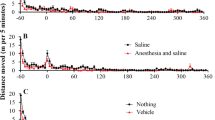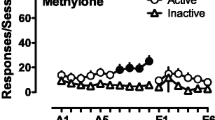Abstract
Rationale: Neuroactive steroids, including the potent anticonvulsants ganaxolone (3α-hydroxy-3β-methyl-5α-pregnan-20-one) and Co 2-1068 (3β-(4acetylphenyl)ethynyl-3α,21-dihydroxy-5β-20-one-21-hemisuccinate), have recently been shown to protect against cocaine-induced seizures. Objectives: The purpose of the present experiments was to determine whether ganaxolone and Co 2-1068 attenuate acute behavioral effects of cocaine unrelated to seizures. Methods: In the first experiment, the locomotor effects of Co 2-1068 (10–100 mg/ kg), pentobarbital (10–100 mg/kg) and haloperidol (0.03–0.3 mg/kg), alone or in combination with cocaine (5.6–30 mg/kg), were determined in mice. In the second experiment, the effects on sucrose intake of ganaxolone (4–16 mg/kg), Co 2-1068 (8–64 mg/kg), pentobarbital (4–32 mg/kg), and haloperidol (0.04–0.4 mg/kg), alone or in combination with cocaine (4–16 mg/kg), were determined in rats. Results: Cocaine caused a dose-related increase in locomotor activity in mice, whereas Co 2-1068, pentobarbital and haloperidol caused dose-related decreases. The dopamine antagonist haloperidol, at a dose that had no effect on activity by itself, but not Co 2-1068 or pentobarbital, attenuated the cocaine-induced increase in locomotor activity. Cocaine, ganaxolone, Co 2-1068, and haloperidol produced dose-related decreases in sucrose intake in rats; the effects of pentobarbital on sucrose intake were variable. As with locomotor effects, haloperidol attenuated the cocaine-induced decrease in sucrose intake. In addition, cocaine-induced decreases in sucrose intake were attenuated by ganaxolone and Co 2-1068. Pentobarbital had no statistically significant effect on the cocaine dose-response function. Conclusions: These results suggest that the interaction of neuroactive steroids with cocaine extends to pharmacologic actions beyond anticonvulsant efficacy, but that the blockade of behavioral effects of cocaine by neuroactive steroids does not apply to all acute behaviors.
Similar content being viewed by others
Author information
Authors and Affiliations
Additional information
Received: 7 September 1999 / Final version: 8 November 1999
Rights and permissions
About this article
Cite this article
Vanover, K., Suruki, M., Huber, M. et al. Neuroactive steroids attenuate cocaine-induced sucrose intake in rats, but not cocaine-induced hyperactivity in mice. Psychopharmacology 149, 269–276 (2000). https://doi.org/10.1007/s002139900350
Issue Date:
DOI: https://doi.org/10.1007/s002139900350




